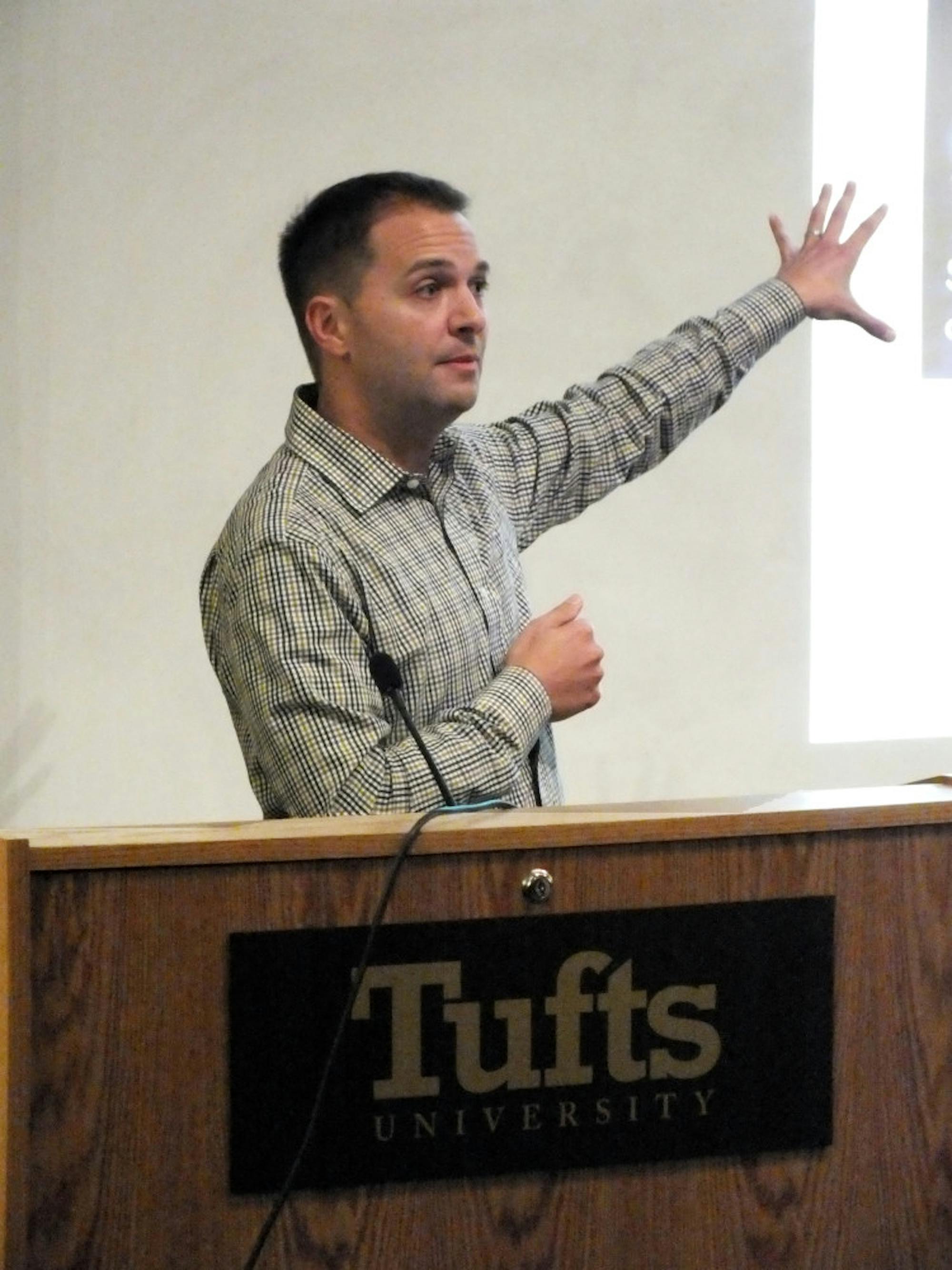Politician and health advocate Carl Sciortino (LA ’00) returned to the Hill last night to discuss his work as executive director of AIDS Action Committee of Massachusetts in a Lesbian Gay Bisexual and Transgender (LGBT) Center event titled, "PrEP, PEP, and the State of HIV Prevention: A Conversation with Carl Sciortino" in Cabot ASEAN Auditorium at 7 p.m.
A founding member of the Rainbow House and other LGBTQ initiatives at Tufts, Sciortino got into politics after receiving an unsatisfactory response from his Massachusetts state representative to a letter he wrote about HIV/AIDS resources. He managed to defeat the incumbent, representing a district that includes parts of Medford and Somerville from 2005 until this past April, when he resigned to join AIDS Action Committee. In 2013, he was defeated by Rep. Katherine Clark (D-Mass.) in a run for national office. The loss pushed him into the public eye, at which point he made public his HIV-positive status.
“I don’t recommend running for Congress. It’s painful,” Sciortino said. “My private life is not my own at all.”
Before this past year, he had only told personal friends about his experience with HIV. Now, he is AIDS Action Committee’s first openly HIV-positive executive director. Sciortino addressed the persistent stigma surrounding HIV/AIDS in the United States.
“We have built a whole new closet around HIV in this community,” he said. “I know far too many people, including people on this campus, that will never tell a soul that they have HIV.”
Sciortino said he contracted the virus on vacation in Cancun, Mexico. He began feeling symptoms within three days of having unprotected sex.
“I was praying to god it was dengue fever or Montezuma’s Revenge or something else,” he said.
Sciortino said he immediately started taking a daily pill which he continues to take now, four years later. While he told his HIV-negative boyfriend at the time that he was “free to go,” he refused, and the two got married last year. Sciortino emphasized how privileged he is to have a stable life.
“I’m lucky to have the support of my family and friends,” he said.
Much of the work AIDS Action Committee does centers around supporting Massachusetts’ 19,165 residents living with HIV/AIDS, especially those whose illness is compounded by homelessness, joblessness and drug addiction. The people they work with are disproportionately men who have sex with men, young black men and heavy drug users.
“Taking care of their health is really, really, really challenging,” Sciortino said. “A lot of it is based on race and class.”
In partnership with the Fenway Community Health Center, AIDS Action Committee is New England’s largest HIV/AIDS service organization. They serve one-sixth of Massachusetts residents living with HIV, providing quality-of-life support and treatment options.
“The most important thing is that treatment is available and treatment is effective,” Sciortino said.
Another aim is what Sciortino called “targeted prevention,” which has proven moderately successful in recent years.
“We reduced new infections by 41 percent in a decade’s time,” he said. “We can get that number to zero.”
One new method that Sciortino is promoting is pre-exposure prophylaxis (PrEP), which goes by the brand name Truvada. He compared the daily pill to birth control -- it is taken by HIV-negative people in order to prevent potential infection.
“It is a new tool in our toolbox to prevent HIV,” Sciortino said. “That is a game-changer if we do it right.”
While studies found an only 44 percent effectiveness over all subjects given PrEP, it was 92 percent effective for those who actually took it every day, according to Sciortino.
“If you adhere to it and take it as prescribed, there is a near-zero chance of getting infected,” he said.
Although Sciortino said he did not want to force anyone to take PrEP, he recommended it for anyone who is not consistently “condom compliant,” which he said was almost every sexually active person he knew.
“I’m not judging. I’m not condoning. I’m just saying, that is the reality,” he said. “We are human beings. We all do things that we know are risky.”
Sciortino also brought up post-exposure prophylaxis (PEP), which is taken within 72 hours of exposure to HIV and then consistently for one month -- he compared this to the morning-after pill.
“It appears to be effective, especially if you start it very quickly,” he said.
While both of these options are available to Tufts students through Health Services, Sciortino worried that students may not pursue them due to confidentiality issues.
“It is a challenge and question for young people who may still be on their parents’ insurance,” he said.
Insurance companies can often withhold this information from parents if asked, however, and Sciortino encouraged students to take their sexual health into their own hands. While one might imagine the emaciated AIDS victims of the 1980's and worry that contracting HIV is a “death sentence,” Sciortino emphasized the ability of HIV-positive people to thrive.
“The misconceptions about living with HIV today are very potent,” he said. “I will live a long, healthy life.”
LGBT Center Director Nino Testa (G ’13), who introduced the discussion, pointed out resources available through the university and local organizations like AIDS Action Committee.
“This event is only part of an ongoing conversation at Tufts,” he said.
Sciortino discusses work fighting HIV/AIDS

Carl Sciortino, the Executive Director of the AIDS Action Committee of Massachusetts, spoke on the progress of HIV prevention.





